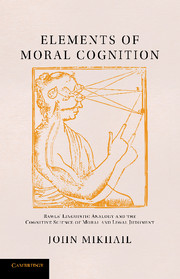 Elements of Moral Cognition
Elements of Moral Cognition Book contents
- Frontmatter
- Contents
- List of Tables and Figures
- Preface
- PART ONE THEORY
- 1 The Question Presented
- 2 A New Framework for the Theory of Moral Cognition
- 3 The Basic Elements of Rawls' Linguistic Analogy
- PART TWO EMPIRICAL ADEQUACY
- PART THREE OBJECTIONS AND REPLIES
- PART FOUR CONCLUSION
- Appendix: Six Trolley Problem Experiments
- Bibliography
- Index
2 - A New Framework for the Theory of Moral Cognition
Published online by Cambridge University Press: 07 September 2011
- Frontmatter
- Contents
- List of Tables and Figures
- Preface
- PART ONE THEORY
- 1 The Question Presented
- 2 A New Framework for the Theory of Moral Cognition
- 3 The Basic Elements of Rawls' Linguistic Analogy
- PART TWO EMPIRICAL ADEQUACY
- PART THREE OBJECTIONS AND REPLIES
- PART FOUR CONCLUSION
- Appendix: Six Trolley Problem Experiments
- Bibliography
- Index
Summary
To search in our common knowledge for the concepts which do not rest upon particular experience and yet occur in all knowledge from experience, of which they as it were constitute the mere form of connection, presupposes neither greater reflection nor deeper insight than to detect in a language the rules of the actual use of words generally and thus to collect elements for a grammar (in fact both researches are very nearly related), even though we are not able to give a reason why each language has just this and no other formal constitution, and still less why any precise number of such formal determinations in general, neither more nor less, can be found in it.
– Immanuel Kant, Prolegomena to Any Future MetaphysicsIn Chapter 1, I referred to aspects of Universal Grammar to which the theory of moral cognition might be usefully compared. In this chapter, I provide an initial statement of some of these comparisons and indicate which of them I take Rawls to have drawn and his critics to have misunderstood. In order to do so, it will be helpful to introduce and explain some technical terminology from Chomsky's framework, as well as some novel terminology of my own. The bulk of the chapter is therefore devoted to establishing a broad analytical framework for the theory of moral cognition and to clarifying certain philosophical issues that arise within this framework.
- Type
- Chapter
- Information
- Elements of Moral CognitionRawls' Linguistic Analogy and the Cognitive Science of Moral and Legal Judgment, pp. 13 - 41Publisher: Cambridge University PressPrint publication year: 2011


